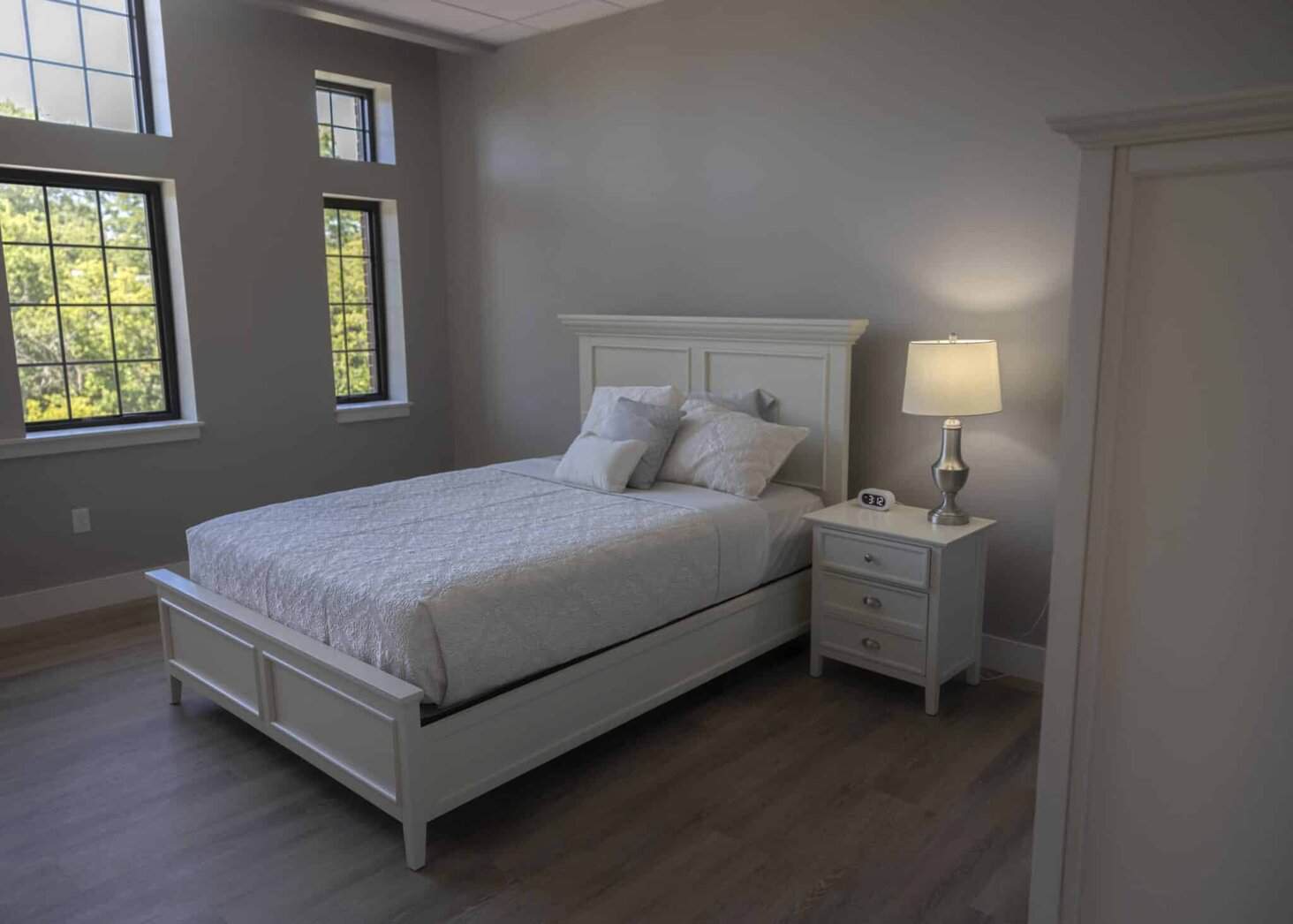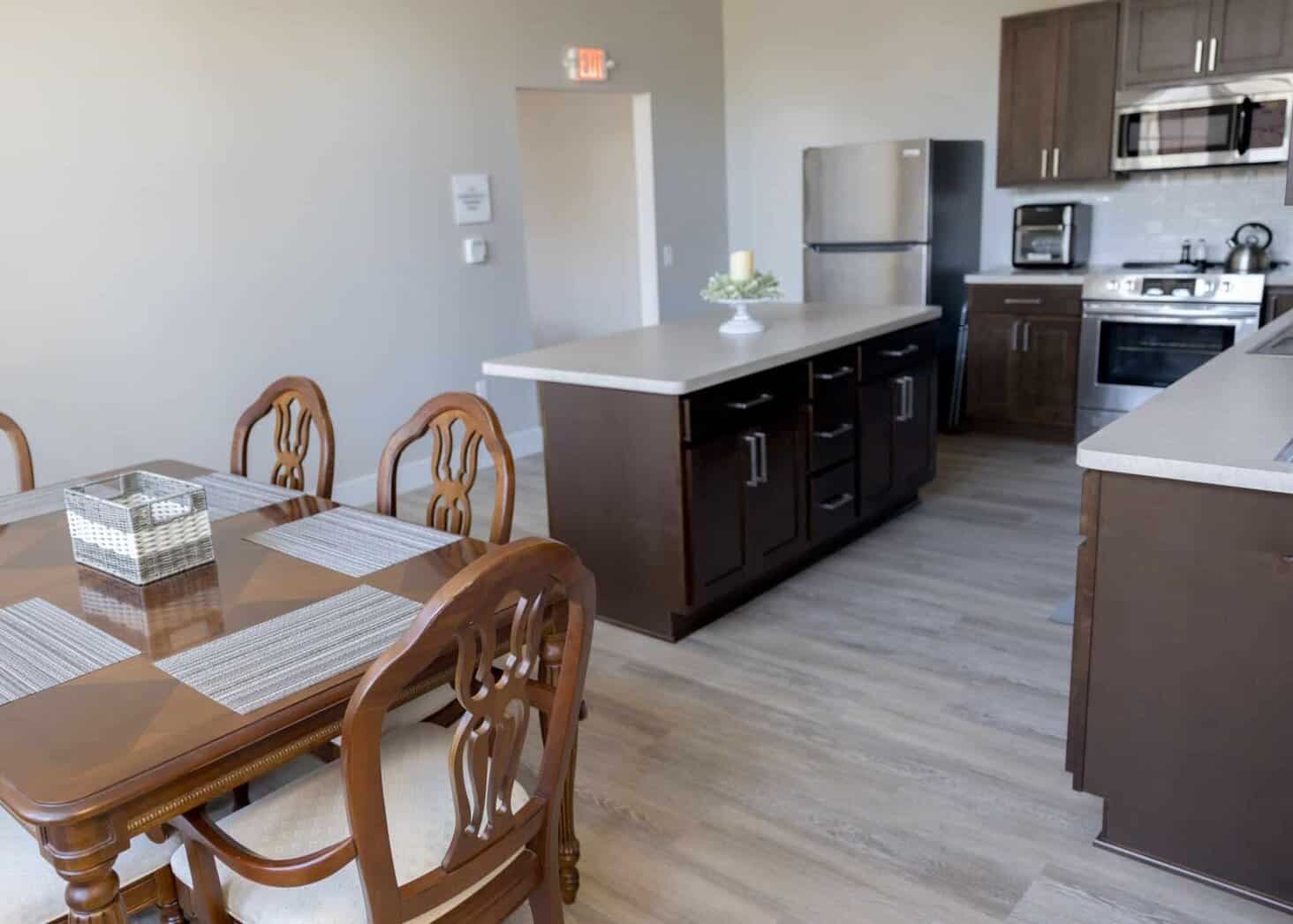$1.25 million Edna House expansion fills recovery gap, adds long-term housing

Several years ago, the team running The Edna House for Women realized they had a significant gap in the recovery services they have been providing since 2003 to women struggling with alcoholism or substance use disorder. They were missing housing accommodations for women who needed to stay beyond the minimum six months of residence to complete the programs to regain their sobriety and then find gainful employment.
Many treatment centers are limited in how much time a person may remain, says Erin Becker, one of the four co-founders of Edna House, located on W. 65th Street in Cleveland. Edna House allows the person to stay as long as necessary to rebuild her life. Before they leave, the goal for each resident is to become sober, strong, law-abiding, and with sustainable employment.
“Our recent Phase III expansion project was a response to the need that we saw,” she explained. “We know the longer that women in recovery stay in safe, sober housing, the longer they remain sober and the greater their chances of long-term sobriety.”
Typically, the projected stay at Edna House is six months, but some women remain for 12 months or more, moving through the different living quarters now available.
“In four and a half years I’ve never had even one woman leave at six months,” related Jennifer Lasky, executive director. “You can’t clean up the wreckage of your past, get sober, and do everything else you need to recover your life in six months, so the average length of stay is eight to 10 months.”
Funding “Phase III” housing for longer-term residents
According to Lasky, the 501(c)(3) non-profit is sustained entirely through private donations from individuals and corporations. Each year, a group of sponsors contribute the $365,000 needed to pay for daily operations. The nine sponsors include The Murphy Family Foundation, Reminger Foundation, Community West Foundation, and RehabAid, which ranks Edna House on its “20 Best Rehab Centers in Cleveland” list. Funding the expansion required a separate capital campaign.
In 2020, after taking a tour of Edna House, two Cleveland businessmen who are in recovery and are followers of Alcoholics Anonymous (AA) donated $62,000 to upgrade the antiquated electrical system in the residence. Next, a generous gift from Mark and Jennifer Busch of Cleveland helped initiate the Phase III expansion project capital campaign.
“The Catherine L. and Edward A. Lozick Foundation knew we were $100,000 short, and they stepped up in a huge way for us,” Lasky added. “The rest of the capital campaign was funded all by individual donations.” The total cost of the expansion was $1.25 million.
Renovation and expansion
In January of 2020, the organization officially purchased the former convent they had been renting from neighboring St. Colman Church for 14 years.
“The Sisters of St. Joseph were the last ones in the convent, and the congregation of St. Joseph continues to support our lifesaving work spiritually and financially,” Lasky explained. “However, while the chapel is used by many of the women who want a special place to pray, we have no religious affiliation with any particular church.”
Additionally, Edna House purchased the adjacent school building, which continues to house Edna House’s Job Skills program and GED tutoring center in classroom spaces on the first floor.
Edna House hired The Krueger Group in Cleveland to perform extensive exterior and interior renovations.
The scope of the Edna House Residence and Education Center project included rewiring the entire 100-year-old residence that houses up to 47 women and installation of a fire-suppression system. The third floor communal living space for most of the women was also refurbished and upgraded with air conditioning. With the support of 100 Women Strong Ohio, both bathrooms on the second floor were renovated with additional showers and new plumbing.
The project modernized and redecorated the kitchen, furnished new flooring throughout the first floor, and renovated the chapel. Grant money from The Greater Cleveland COVID-19 Rapid Response Fund and The Murphy Family Foundation enabled upgrades to the building’s outdated IT infrastructure and services.
To create the Education Center, Krueger cleaned and rehabilitated the interior of the nearly century-old former school building, installed a fire-suppression system, replaced 60 second-floor windows, and completed full modernization of mechanical systems.
To specifically address Edna House’s “gap in recovery services,” the remodeled second floor features ten long-term residential suites that are spacious and beautifully furnished to provide post six-month recovery services for residents who need them.
Edna House asked a core group of alumnae and residents to work with The Krueger Group’s architects during the design phase to recommend what design elements would help residents be more comfortable and stay longer, such as a communal dining area to foster fellowship. During the extensive construction, the residents continued to live, eat, and have groups in the house; the renovations were completed in February 2021.
On June 16, 2022, the organization held an Open House to celebrate completion of the two-year, $1.25 million Phase III expansion project.

How Edna House’s recovery program works
For the first three months of the 12-step, abstinence-based program, residents arise early each morning to do their house chores or clean up the campus property.
“We have the cleanest corner of Cleveland,” Lansky said.
“The Edna House does such a great job of involving people from the neighborhood in their meetings and activities,” said Nicole Brichacek, founder and owner, Gypsy Beans Coffee Shop & Baking Co. at West 65th Street and Detroit Avenue. “The amount of people from the neighborhood when I toured the new facility was just amazing, and everyone is so supportive of the work that they do.”
Brichacek, who lives nearby, has also hired a number of the women over the years and said they always make exceptional employees.
Monday through Saturday from 8:30 a.m. to 4 p.m. Edna House residents spend the day in recovery group sessions facilitated by volunteers from the outside recovery community or Edna House alumnae. In the evenings, they get rides from alumnae or others from Cleveland’s recovery community to AA meetings. Sundays are spent with their families at their homes, a restaurant, or wherever they would like to meet. Edna House actively encourages maintaining family connections while the women are staying at the sober house, especially for mothers who are away from their children or may have entrusted their care to other family members.
In their fourth month, the women move into the 10 second-floor private bedrooms from their third-floor communal living quarters. They focus on job skills training to help them find jobs. They learn resume writing and interviewing skills, and they have access to a wide selection of business clothing to wear for interviews. One benefactor furnishes bus passes to get to interviews, and umbrellas in case it’s raining.
When they first arrive at Edna House, women can enter without any money, and then they pay back the monthly fees for rent and rehabilitation services in installments once they have employment.
Payments for months one through four are $100 a month, and that is deferred until after they get a job. Women who get a job in the fifth and sixth month of residency pay $375 and are put on a payment plan to pay back the total of $400 for the first 4 months.
“Everyone defers as no one has a penny when they come in, and we don’t want them to ask parents or family,” Lasky said. “We make them wait until it’s their money so they learn to be independent.”
Additionally, to foster independent living, the program does not encourage residents to seek any public assistance such as food stamps. Edna House also wants them to return to their families or find their own housing, but only when they are completely ready.
“Our Phase III residents pay a respectable amount of $400 per month, and it’s beautiful, brand-new, and they are still on our safe, sober, supportive campus, and they still have a staff member who oversees them but much less than in the residence,” Lansky said. “They stay in our community until they are ready to go out and have enough money to be off-campus, so they’re paying for a good place to live and saving for their future.”

Addressing long-term trauma
When an anonymous donor asked if there was “a big-ticket item, something we had dreamed of,” Becker informed, the immediate answer was a trauma counselor. Having that expertise in-house filled another gap in services. The benefactor funded five years of a trauma counselor’s salary, increasing the full-time staff to five.
“We have women who would become physically sober, but their past trauma and the emotions they had to face without numbing it all with drugs or alcohol was too much,” explained Becker, who worked at Edna House for two years after it opened. “Some of those women have been coming back to Edna House like a revolving door.”
In addition to hiring a trauma counselor, Becker also asked Stephen Silva, who is independently licensed as a social worker and chemical dependency counselor at the Hanna Perkins Center for Child Development and has a long-term relationship with the organization, to serve as a trauma consultant. His expertise in psychoanalysis helps the women deal with their deeply seated traumas.
Silva explains that the research indicates that one out of four women who are in recovery have been traumatized, and the percentages are significantly higher in women living in sober houses and long-term care.
“The trauma is strongly pronounced in some of the women there,” Silva said. “So they have the most difficulty establishing trusting relationships, and you can’t remain sober without those.”
He adds that he finds Edna House’s program particularly effective because the 12-step recovery approach works best for the most people, and “the psychological benefits in working the steps are immense.”
“One of the purposes of Edna House is to create a safe, structured community for the women to begin to trust again and start to look at things in their lives that they haven’t been able to reflect upon before,” Silva said. “Edna House gives the women the time needed to do that that they won’t get in an Intensive Outpatient Program or 30-day treatment setting.”
A resident since January, Amanda Freed credits The Edna House for Women with saving her life: “Six months ago, I was in a suicidal alcoholic stupor, and Jenn and the staff brought me back to this house because I had left after 60 days [in September 2021]. Had that not happened, I am not sure I would be here today.”
